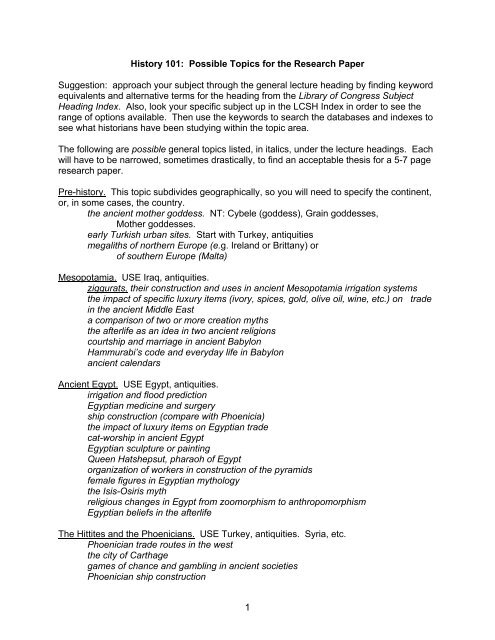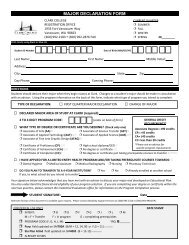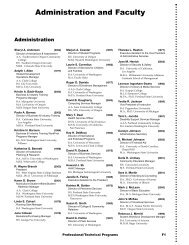History 101: Possible Topics for the Research Paper
History 101: Possible Topics for the Research Paper
History 101: Possible Topics for the Research Paper
You also want an ePaper? Increase the reach of your titles
YUMPU automatically turns print PDFs into web optimized ePapers that Google loves.
<strong>History</strong> <strong>101</strong>: <strong>Possible</strong> <strong>Topics</strong> <strong>for</strong> <strong>the</strong> <strong>Research</strong> <strong>Paper</strong><br />
Suggestion: approach your subject through <strong>the</strong> general lecture heading by finding keyword<br />
equivalents and alternative terms <strong>for</strong> <strong>the</strong> heading from <strong>the</strong> Library of Congress Subject<br />
Heading Index. Also, look your specific subject up in <strong>the</strong> LCSH Index in order to see <strong>the</strong><br />
range of options available. Then use <strong>the</strong> keywords to search <strong>the</strong> databases and indexes to<br />
see what historians have been studying within <strong>the</strong> topic area.<br />
The following are possible general topics listed, in italics, under <strong>the</strong> lecture headings. Each<br />
will have to be narrowed, sometimes drastically, to find an acceptable <strong>the</strong>sis <strong>for</strong> a 5-7 page<br />
research paper.<br />
Pre-history. This topic subdivides geographically, so you will need to specify <strong>the</strong> continent,<br />
or, in some cases, <strong>the</strong> country.<br />
<strong>the</strong> ancient mo<strong>the</strong>r goddess. NT: Cybele (goddess), Grain goddesses,<br />
Mo<strong>the</strong>r goddesses.<br />
early Turkish urban sites. Start with Turkey, antiquities<br />
megaliths of nor<strong>the</strong>rn Europe (e.g. Ireland or Brittany) or<br />
of sou<strong>the</strong>rn Europe (Malta)<br />
Mesopotamia. USE Iraq, antiquities.<br />
ziggurats, <strong>the</strong>ir construction and uses in ancient Mesopotamia irrigation systems<br />
<strong>the</strong> impact of specific luxury items (ivory, spices, gold, olive oil, wine, etc.) on trade<br />
in <strong>the</strong> ancient Middle East<br />
a comparison of two or more creation myths<br />
<strong>the</strong> afterlife as an idea in two ancient religions<br />
courtship and marriage in ancient Babylon<br />
Hammurabi’s code and everyday life in Babylon<br />
ancient calendars<br />
Ancient Egypt. USE Egypt, antiquities.<br />
irrigation and flood prediction<br />
Egyptian medicine and surgery<br />
ship construction (compare with Phoenicia)<br />
<strong>the</strong> impact of luxury items on Egyptian trade<br />
cat-worship in ancient Egypt<br />
Egyptian sculpture or painting<br />
Queen Hatshepsut, pharaoh of Egypt<br />
organization of workers in construction of <strong>the</strong> pyramids<br />
female figures in Egyptian mythology<br />
<strong>the</strong> Isis-Osiris myth<br />
religious changes in Egypt from zoomorphism to anthropomorphism<br />
Egyptian beliefs in <strong>the</strong> afterlife<br />
The Hittites and <strong>the</strong> Phoenicians. USE Turkey, antiquities. Syria, etc.<br />
Phoenician trade routes in <strong>the</strong> west<br />
<strong>the</strong> city of Carthage<br />
games of chance and gambling in ancient societies<br />
Phoenician ship construction<br />
1
<strong>the</strong> organization of Hittite towns and farmlands<br />
Hittite ironworking<br />
The Assyrians and <strong>the</strong> Persians<br />
<strong>the</strong> chariot in Assyrian warfare<br />
Assyrian social class structure<br />
Assyrian and Persian road building<br />
sun, moon, and fire deities<br />
<strong>the</strong> development of Persian ideas of divine kingship<br />
Persian artistic traditions and <strong>the</strong>ir influence on carpet design<br />
Paradise, a Persian idea<br />
Zoroastrianism and Mithraism<br />
Persian astrology<br />
Persian cuisine<br />
The Hebrews.<br />
wedding customs of <strong>the</strong> ancient Hebrews<br />
creation in Genesis and in ancient Mesopotamia<br />
ancient musical modes and instruments<br />
Hebrew kingship, its development and decline<br />
<strong>the</strong> role of <strong>the</strong> prophet in ancient Hebrew political life<br />
dietary restrictions and purification rituals in ancient Hebrew culture<br />
Jewish religious cults and <strong>the</strong> Dead Sea Scrolls<br />
social welfare in Hebrew religious thought<br />
ceremonial foods<br />
Ancient India.<br />
<strong>the</strong> horse in early Hindu religion and warfare<br />
domestic architecture in Harappa and Mohenjo-daro<br />
<strong>the</strong> origins of yogism<br />
<strong>the</strong> impact of Buddhism on Indian sculpture and architecture<br />
Buddhist monasticism and <strong>the</strong> missionary spread of Buddhism<br />
marriage and family under <strong>the</strong> Hindu cast system<br />
development of <strong>the</strong> Hindu law codes<br />
Ancient China.<br />
early Chinese irrigation and flood control systems<br />
bronze working in early China<br />
Confucianism and <strong>the</strong> Chinese family<br />
yin and yang in Chinese art<br />
<strong>the</strong> Mandate of Heaven, a Chinese concept<br />
Chinese ship design<br />
<strong>the</strong> centralization of Chinese imperial government<br />
peasant social customs<br />
food and family celebrations<br />
Minoan Crete, Mycenae and Archaic Greece.<br />
Cretan trade in <strong>the</strong> pre-Mycenaean era<br />
Minoan painting<br />
2
<strong>the</strong> destruction of Knossos<br />
<strong>the</strong> collapse of Mycenaean society<br />
development of <strong>the</strong> polis in archaic Greece<br />
weaponry of <strong>the</strong> Homeric Greeks<br />
<strong>the</strong> myth of <strong>the</strong> labyrinth<br />
Classical Greece.<br />
development of <strong>the</strong> Greek city-state (polis) in A<strong>the</strong>ns or Sparta<br />
<strong>the</strong> role of <strong>the</strong> Delphic oracle in classical religion and politics<br />
Greek naval battles of <strong>the</strong> Persian Wars<br />
<strong>the</strong> role of women in Spartan or A<strong>the</strong>nian society<br />
public architecture in Periclean A<strong>the</strong>ns<br />
development of Greek drama and structure of <strong>the</strong>aters<br />
Sappho of Lesbos and <strong>the</strong> poetry of love<br />
voting rights and civic obligations of citizens in Hellenic A<strong>the</strong>ns<br />
free speech: <strong>the</strong> role of Old Comedy in A<strong>the</strong>nian democracy<br />
<strong>the</strong> plague in A<strong>the</strong>ns during <strong>the</strong> Peloponnesian War<br />
Herodotus’s descriptions of <strong>the</strong> Persian allies in The Persian Wars<br />
<strong>the</strong> death of Socrates<br />
<strong>the</strong> institution of ostracism<br />
Hellenistic Civilization. USE <strong>the</strong> specific country involved, eg. Egypt <strong>for</strong> <strong>the</strong> Ptolemies,<br />
etc.<br />
<strong>the</strong> development of Greek military organization from <strong>the</strong> classical period to <strong>the</strong><br />
time of Alexander<br />
Alexander’s conquest of nor<strong>the</strong>rn India<br />
a comparison of classical and Hellenistic sculpture<br />
Philip of Macedon and <strong>the</strong> unification of Greece<br />
science and ma<strong>the</strong>matics in ancient Alexandria<br />
<strong>the</strong> nature and role of <strong>the</strong> great library of Alexandria<br />
Hellenistic town-planning--<strong>the</strong> new Greek cities<br />
Hellenistic trade in spices<br />
Hellenistic geographers<br />
<strong>the</strong> cult of Isis in Hellenistic Egypt<br />
Cleopatra, last of <strong>the</strong> Ptolemies<br />
Hellenistic medicine<br />
The Rise of Rome and <strong>the</strong> Roman Republic.<br />
development of Roman military organization and tactics<br />
Etruscan influences on early Roman art and society<br />
<strong>the</strong> education of <strong>the</strong> Roman senatorial class<br />
<strong>the</strong> impact of <strong>the</strong> Punic Wars on Roman political and military life<br />
development of Roman military technology<br />
Roman Life.<br />
<strong>the</strong> impact of malaria or ano<strong>the</strong>r major disease on Mediterranean life<br />
gladiators, civic games, and o<strong>the</strong>r public entertainments<br />
<strong>the</strong> Roman baths, <strong>the</strong> architecture and social role<br />
Roman house design<br />
3
Roman cookery<br />
<strong>for</strong>tune-telling and horoscopes in ancient Rome<br />
Fortune’s wheel and <strong>the</strong> role of gambling in Roman society<br />
<strong>the</strong> ideal of citizenship in Republican and Imperial Rome<br />
life in a Roman villa<br />
Stoicism and <strong>the</strong> thinking of Roman patricians<br />
a detailed look at a Roman colonial settlement in France or Britain<br />
slave revolts<br />
The Roman Empire.<br />
Cicero and <strong>the</strong> transition to Empire<br />
<strong>the</strong> role of <strong>the</strong> Roman army in <strong>the</strong> “election” of <strong>the</strong> later emperors<br />
<strong>the</strong> Roman destruction of Jerusalem, and <strong>the</strong> Jewish diaspora<br />
<strong>the</strong> idea of citizenship in Republican and Imperial Rome<br />
Roman aqueducts, sewers and hypocausts<br />
The Celts.<br />
Celtic religious practices and <strong>the</strong> role of <strong>the</strong> druids<br />
<strong>the</strong> Roman conquest of Gaul<br />
<strong>the</strong> role of women in Celtic society<br />
bards and brehons: men of learning in early Irish society<br />
Celtic warfare<br />
Boudicca, queen of <strong>the</strong> Iceni, & <strong>the</strong> revolt against <strong>the</strong> Romans<br />
The Advent of Christianity.<br />
imperial persecutions<br />
St. Paul and <strong>the</strong> mission to <strong>the</strong> gentiles<br />
<strong>the</strong> role of bishops and deacons in <strong>the</strong> early church<br />
Christianity and slavery--<strong>the</strong> impact of Christian ideas on <strong>the</strong> treatment of slaves<br />
“accommodations”--Christian holidays and pagan celebrations<br />
<strong>the</strong> catacombs<br />
<strong>the</strong> role of women in <strong>the</strong> early church<br />
The Growth of Christianity.<br />
<strong>the</strong> Rule of St. Benedict and early monasticism<br />
St. Augustine and Christian ideas of marriage and family<br />
double monasteries<br />
Pope Gregory <strong>the</strong> Great and <strong>the</strong> emergence of <strong>the</strong> papacy<br />
major symbols and rituals of early Christianity<br />
Celtic religious practices and <strong>the</strong> role of <strong>the</strong> druids<br />
<strong>the</strong> role of Irish monks in <strong>the</strong> conversion of <strong>the</strong> Germanic tribes<br />
Irish scriptoria and <strong>the</strong> development of medieval calligraphy<br />
trans<strong>for</strong>mation of Celtic deities into Christian saints<br />
The Germanic Tribes.<br />
kingship in Germanic tribal society<br />
<strong>the</strong> Vandals and <strong>the</strong> decline of Roman government outside Italy<br />
Germanic lawcodes and ideas of justice<br />
<strong>the</strong> relationship between lords and retainers<br />
4
<strong>the</strong> relationship between Pope Leo and Attila <strong>the</strong> Hun<br />
Byzantium.<br />
<strong>the</strong> Empress Theodora and Byzantine politics<br />
<strong>the</strong> Iconoclastic controversy and Byzantine Christianity<br />
St. Basil and Greek monasticism<br />
patterns of landholding <strong>the</strong> Byzantium<br />
Islam.<br />
Bedouin society be<strong>for</strong>e Islam<br />
<strong>the</strong> explosive spread of Islam in <strong>the</strong> century after <strong>the</strong> Prophet’s death<br />
Islamic justice and <strong>the</strong> People of <strong>the</strong> Book<br />
Arab medical practices and <strong>the</strong> establishment of hospitals<br />
China and Japan.<br />
porcelain manufacture and export from China<br />
Chinese ship design<br />
Japanese trans<strong>for</strong>mations of Buddhism<br />
<strong>the</strong> early stages of Japanese feudalism--<strong>the</strong> bushido code<br />
Chinese herbal medicine<br />
The Carolingians and Feudalism.<br />
Frankish law and <strong>the</strong> new empire<br />
<strong>the</strong> invention of <strong>the</strong> stirrup and its effects on mounted warfare<br />
missi dominici<br />
<strong>the</strong> early development of kingship in Scotland<br />
The Vikings and <strong>the</strong> Anglo-Saxons.<br />
Viking towns and trade networks<br />
<strong>the</strong> emergence of Northumbria as a center of learning in <strong>the</strong> 7 th and 8 th centuries<br />
Alfred <strong>the</strong> Great and <strong>the</strong> kingdom of Wessex<br />
Arthur and British resistance to <strong>the</strong> Anglo-Saxons<br />
Early Africa.<br />
<strong>the</strong> emergence of Christianity in Ethiopia<br />
<strong>the</strong> Nok culture<br />
Meroe<br />
Meso-America.<br />
Maya agricultural practices<br />
temple architecture in early Maya culture<br />
decipherment of Maya writing<br />
mythology of early Mexico<br />
5<br />
Common/RefHandouts/history<strong>101</strong>_topics








